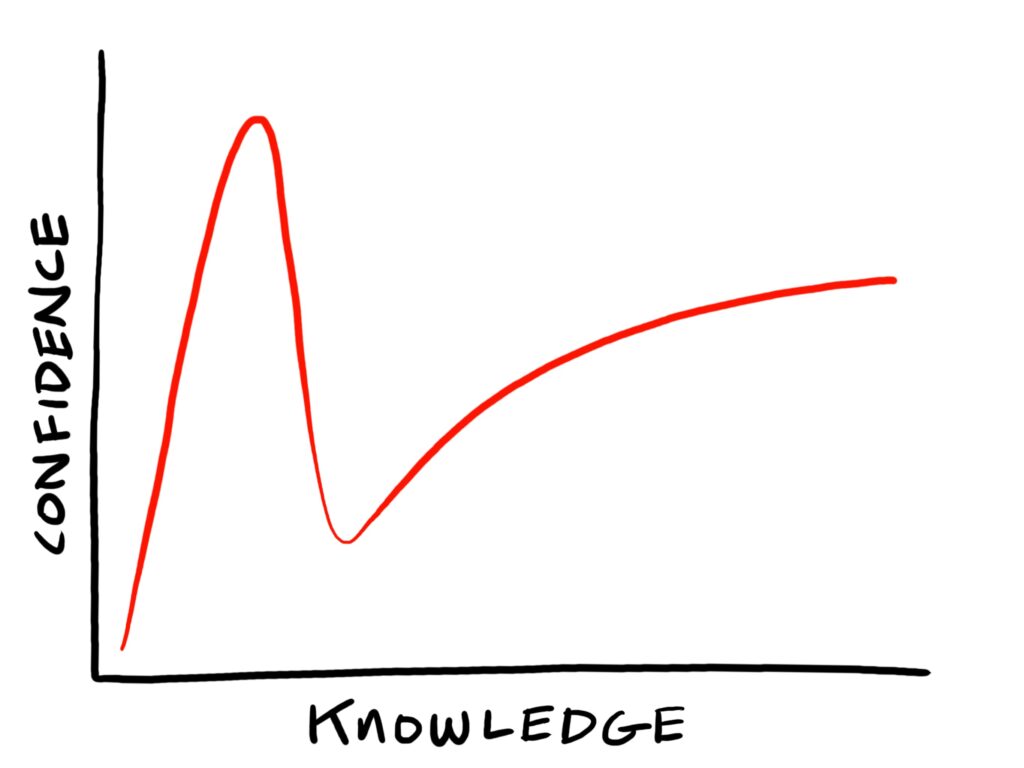
What Is the Dunning-Kruger effect?
The Dunning-Kruger effect is a psychological phenomenon in which people who have low levels of knowledge or ability in a particular domain tend to overestimate their knowledge or ability in that domain. This can happen because people who lack knowledge or ability in a particular area may not be aware of their own limitations, and may therefore be unable to accurately assess their own level of knowledge or ability. For example, if you are not skilled in a particular subject, you may believe that you are more skilled than you really are, and may be unaware of your own shortcomings. The Dunning-Kruger effect can lead to errors in judgment and decision-making, as it can cause people to underestimate the difficulty of a task or the complexity of a situation, and to be unprepared for the consequences. To avoid the Dunning-Kruger effect, it is important to be aware of our own limitations and to seek feedback and guidance from others who are more knowledgeable or skilled in a particular area. This can help us to accurately assess our own level of knowledge or ability, and to make informed decisions about the tasks or challenges that we are facing.
What is an example of Dunning-Kruger effect?
An example of the Dunning-Kruger effect is when a person who is not a medical professional, but who has read a few articles on the internet about a certain illness, starts to diagnose people with the same illness based on limited knowledge. They may believe that they have a deep understanding of the illness and confidently offer advice to others, even though they are not qualified to do so.
In contrast, a medical professional who has years of experience in treating the same illness may underestimate their own abilities and feel that they still have much to learn. They may be hesitant to offer a diagnosis until they have thoroughly examined the patient and considered all the relevant information.
This example illustrates how the Dunning-Kruger effect can lead people to overestimate their abilities and knowledge, while underestimating the expertise of others. It highlights the importance of being self-aware, seeking feedback, and recognizing the need for continued learning and improvement.
Who suffers from the Dunning-Kruger effect?
The Dunning-Kruger effect can affect anyone, regardless of age, gender, or background. It is a cognitive bias that arises when people are unable to recognize their own incompetence due to a lack of self-awareness, feedback, or accurate information.
People who are new to a task or skill, or who have limited experience in a certain area, are particularly susceptible to the Dunning-Kruger effect. They may overestimate their abilities and believe that they have mastered a task or skill when, in reality, they have not.
However, even experts in a field can also be affected by the Dunning-Kruger effect. This can happen when they become overconfident in their abilities and fail to recognize their limitations or the need for continued learning and improvement.
In short: the Dunning-Kruger effect can affect anyone, but it is important to be aware of it and take steps to mitigate its impact by seeking feedback, learning from mistakes, and recognizing the need for ongoing improvement.
How do you know if you suffer from the Dunning-Kruger effect?
It can be difficult to recognize if you suffer from the Dunning-Kruger effect because by definition, this cognitive bias leads to a lack of self-awareness. However, here are some signs that you might be experiencing this phenomenon:
Overconfidence
You feel very confident in your abilities or knowledge, even though you have little or no experience in the area. You may be quick to offer solutions or advice, without taking the time to fully understand the problem or situation.
Lack of Awareness
You may be unaware of your own limitations and fail to recognize areas where you need to improve. You may assume that you know everything there is to know about a topic, even though you have not researched or studied it thoroughly.
Inability to Learn
You may find it difficult to learn new information or skills, or you may be resistant to feedback or suggestions for improvement. You may feel that you already know everything there is to know, and there is no need for further learning.
Overestimating your performance
You may think that you are performing much better than you actually are. For example, you may think that you are doing well in a job or project, but in reality, you are making mistakes or not meeting expectations.
If you notice these signs in yourself, it’s important to take a step back and try to gain a more objective perspective. Seek feedback from others, be open to learning and improvement, and try to approach new tasks or situations with humility and an open mind.
Is the Dunning Kruger effect real?
The Dunning-Kruger effect may not be a genuine cognitive bias, as it can be replicated using random, computer-generated data.
Critics argue that the effect might be a result of the way data is measured and visualized, rather than an actual flaw in human thinking. Furthermore, the unreliability of self-assessment measurements could contribute to the observed effect. Although the Dunning-Kruger effect has been widely cited in media and popular culture, it is essential to consider the academic criticisms and ongoing debates surrounding its validity.




